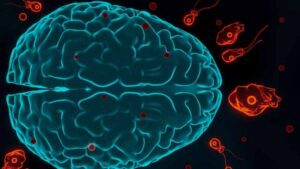
Getty Image
A new study has found a concerning link between alcohol consumption—a common activity among adults in the UK—and the progression of Alzheimer’s disease. Alzheimer’s is a devastating neurodegenerative condition that gradually destroys memory, impairs thinking skills and eventually leads to dementia. Common symptoms include memory loss, issues with thinking and reasoning, language difficulties, sensory changes, and mood shifts. The causes of Alzheimer’s are complex, but recent findings suggest that alcohol use may play a role in accelerating the disease, according to The Mirror.
The study, conducted by researchers at Scripps Research and published in eNeuro in September, “supports the idea that alcohol use may promote Alzheimer’s disease progression.” This research builds on previous studies from the Sanna lab, which demonstrated that excessive alcohol consumption speeds up Alzheimer’s progression in mice genetically predisposed to the disease. Now, this latest study provides new insights by identifying similar gene expression changes related to alcohol use disorder and Alzheimer’s disease, particularly affecting inflammation and cellular functions in the brain.
In the UK, Alzheimer’s is the most common cause of dementia, with the Alzheimer’s Society reporting that one in three people born today will likely develop dementia in their lifetime. Many of these cases will be due to Alzheimer’s, highlighting the need for a deeper understanding of risk factors and potential contributors to the disease’s development and progression.
Early detection and diagnosis are essential for managing Alzheimer’s. When individuals notice worsening memory or thinking problems, it is recommended they consult a health professional, often their general practitioner (GP). If the GP suspects that dementia may be causing the symptoms, they can refer the patient to a local memory service for more comprehensive testing. Alzheimer’s is usually diagnosed by a specialist, and early diagnosis offers several advantages, including the potential to manage symptoms more effectively and plan for future care. told by NIH.
The study’s findings underscore the importance of addressing alcohol consumption as a potential modifiable risk factor for Alzheimer’s progression. Although alcohol use is common among adults, understanding its impact on brain health is crucial, especially given its potential role in influencing inflammatory and cellular processes tied to Alzheimer’s disease.
Further research is ongoing to explore the precise mechanisms by which alcohol may accelerate Alzheimer’s disease. The study from Scripps Research adds to growing evidence that lifestyle choices, such as alcohol consumption, may significantly affect the trajectory of Alzheimer’s and related neurodegenerative diseases.


